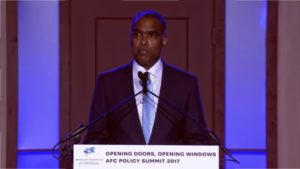
Educators and policymakers at the American Federation of Children‘s annual summit in Indianapolis this week were all speaking in unison about a shift in the classroom that they believe will improve student achievement: personalizing learning to meet the needs of individual students, allowing them to learn at their own pace.
A week earlier, at a separate event, the New Schools Venture Fund Summit sounded a similar theme.
Personalized learning has been a talking point in education policy circles for years. Some skeptics argue that what some people call “personalization,” is really just a new-fangled buzzword for plain good teaching that takes students’ individual needs and abilities into account.
Still, the buzz coming out of education conferences shows how personalized learning has become a focal point for philanthropists and practitioners. During a time of growing ideological division, it is one of the few concepts that still unites disparate wings of the education reform movement.
At the ACF summit, former Florida Gov. Jeb Bush said customizing learning and considering the “uniqueness” of each student is a critical step in the future of education.
“Students learn in different ways,” he said.
Bush said only one-third of the country’s children are college or career ready — a statistic he said illustrates the urgency of improving education for every child.
At its core, personalized learning refers to the idea that education should be tailored to every student’s needs, interests and strengths. Debates persist among theorists and practitioners about how that ideal should translate to classrooms. Some argue the concept has been around for more than a 100 years. But the rise of technology and standards-based instruction have enabled some real shifts. Educators now have unprecedented ability to help students take responsibility and ownership for their learning.
Prior to the launch of personalized learning, teachers would stand at the front of classrooms, delivering lectures. Students would complete similar assignments on similar time frames. Personalized learning provides students more opportunities to make choices in their learning, as they participate in projects and work in small groups based on their interests and needs.
For example, when given a Florida Standard to master, students could choose the way they will show their knowledge of that specific standard. They might answer a series of questions, write an essay, or take part in a project.
One critical aspect of personalization is competency-based learning, which allows students to advance to a higher level of learning regardless of the time they spend on a subject once they show mastery.
At the AFC summit, Education Secretary Betsy DeVos said all types of schools should embrace that concept.
“Education should measure actual mastery of subject matter, not how much time you spend on that seat,” she said.
Sajan George, the founder and chief executive officer of Matchbook Learning, gave the final speech of the summit. He founded the nonprofit charter school turnaround organization to improve some of the lowest-performing schools in the nation using a competency-based approach.
“I think the root cause (in the classroom) is a design problem,“ George said. “(Students) lack personalization. I believe the personalized learning model can change the structure of our nation.”
In 2016, Florida passed a law giving Lake, Seminole, Pinellas and Palm Beach counties, and one university-based lab school, the opportunity to participate in a pilot program to experiment with competency-based learning. The Bill and Melinda Gates Foundation has awarded personalized learning grants to school districts in Lake and Pinellas counties.
In upcoming articles, we will look at how personalized learning is unfolding in Florida schools.


